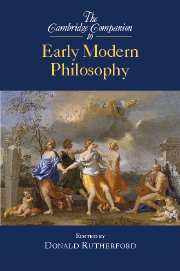Book contents
- Frontmatter
- Introduction
- 1 Innovation and orthodoxy in early modern philosophy
- 2 Knowledge, evidence, and method
- 3 From natural philosophy to natural science
- 4 Metaphysics
- 5 The science of mind
- 6 Language and logic
- 7 The passions and the good life
- 8 The foundations of morality: virtue, law, and obligation
- 9 Theories of the state
- 10 Theology and the God of the philosophers
- 11 Scholastic schools and early modern philosophy
- 12 Toward enlightenment: Kant and the sources of darkness
- Short biographies of major early modern philosophers
- Bibliography
- Index
- Series list
10 - Theology and the God of the philosophers
Published online by Cambridge University Press: 28 January 2007
- Frontmatter
- Introduction
- 1 Innovation and orthodoxy in early modern philosophy
- 2 Knowledge, evidence, and method
- 3 From natural philosophy to natural science
- 4 Metaphysics
- 5 The science of mind
- 6 Language and logic
- 7 The passions and the good life
- 8 The foundations of morality: virtue, law, and obligation
- 9 Theories of the state
- 10 Theology and the God of the philosophers
- 11 Scholastic schools and early modern philosophy
- 12 Toward enlightenment: Kant and the sources of darkness
- Short biographies of major early modern philosophers
- Bibliography
- Index
- Series list
Summary
The God that philosophers in the early modern period intended to refer to was the God of the Judeo-Christian tradition, which is to say, the being who created the world, who spoke to Moses from the burning bush, and who, through Jesus Christ, saved mankind from the consequences of sin. But who that being is, and what he means for human existence, was a matter of serious and sometimes mortal debate, even, and especially, within this tradition. This controversy is rather ironic because it was agreed that God had explicitly revealed himself through the texts that had come to be known as the Bible ( ”the book”).
Outside this tradition, there was not much of relevance. Islam was regarded as the paradigmatic religion of the infidel, and was summarily dismissed, especially insofar as it was thought to embrace a fatalism incompatible with human freedom and responsibility. Even so, it had a few important, if unacknowledged, influences. There is a connection, for example, between David Hume’s famous analysis of causation in terms of constant conjunction (via Nicolas Malebranche and Francisco Suárez) and the Arab occasionalist al- Farabi. Second, largely because of Jesuit missionaries, there was a certain interest in the Far East which at least shaped some philosophical thinking.
- Type
- Chapter
- Information
- The Cambridge Companion to Early Modern Philosophy , pp. 274 - 298Publisher: Cambridge University PressPrint publication year: 2006



